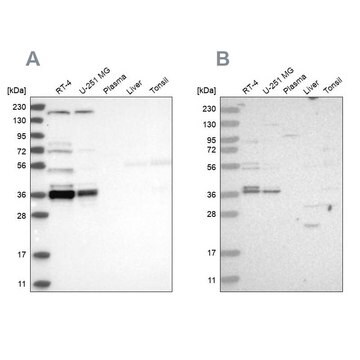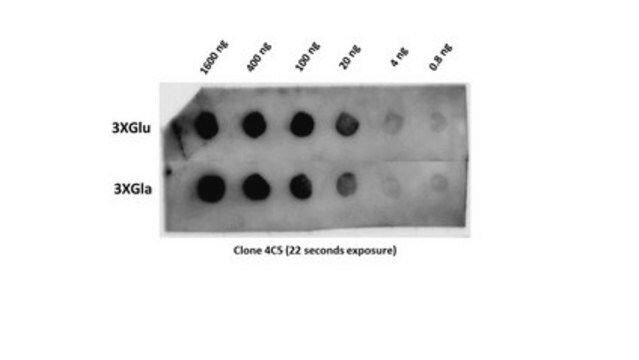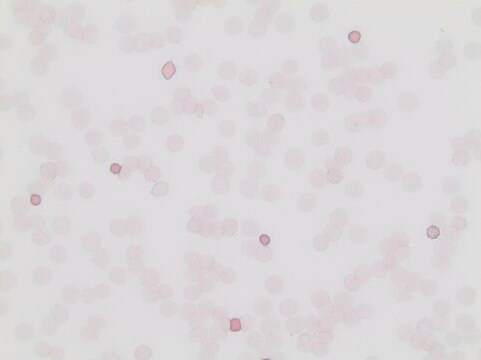MABN528
Anti-Glypican-4 Antibody, clone 1C7.2
culture supernatant, clone 1C7.2, from mouse
Synonym(s):
Glypican-4, K-glypican, Secreted glypican-4
Sign Into View Organizational & Contract Pricing
All Photos(2)
About This Item
UNSPSC Code:
12352203
eCl@ss:
32160702
NACRES:
NA.41
Recommended Products
biological source
mouse
Quality Level
antibody form
culture supernatant
antibody product type
primary antibodies
clone
1C7.2, monoclonal
species reactivity
human, mouse
technique(s)
western blot: suitable
isotype
IgG2bκ
NCBI accession no.
UniProt accession no.
shipped in
dry ice
target post-translational modification
unmodified
Gene Information
human ... GPC4(2239)
General description
Glypican-4 is a glycosylphosphatidylinositol (GPI)-anchored cell surface heparan sulfate proteoglycan (HSPG) that is encoded by the GPC4 gene in human. Glypican-4 belongs to the family of glypican-related integral membrane proteoglycans (GRIPs) that may be involved in the control of cell division and growth regulation. Deletion of the entire GPC4 gene and the two exons at the 3′ end of the adjacent GPC3 gene has been reported in a patient diagnosed with Simpson-Golabi-Behmel syndrome (SGBS).
Immunogen
GST-tagged recombinant protein corresponding to human Glypican-4.
Application
Anti-Glypican-4 Antibody, clone 1C7.2 is an antibody against Glypican-4 for use in Western Blotting.
Research Category
Neuroscience
Neuroscience
Research Sub Category
Developmental Signaling
Developmental Signaling
Western Blotting Analysis: A 1:500 dilution from a representative lot detected Glypican-4 in 10 µg of mouse whole embryo, mouse E16 brain, and human kidney tissue lysate.
Quality
Evaluated by Western Blotting in mouse E17 spinal cord tissue lysate.
Western Blotting Analysis: A 1:500 dilution of this antibody detected Glypican-4 in 10 µg of mouse E17 spinal cord tissue lysate.
Western Blotting Analysis: A 1:500 dilution of this antibody detected Glypican-4 in 10 µg of mouse E17 spinal cord tissue lysate.
Target description
~62 kDa observed
Physical form
Mouse monoclonal IgG2bκ in tissue culture supernatant containing 0.05% sodium azide
Unpurified
Storage and Stability
Stable for 1 year at -20°C from date of receipt.
Handling Recommendations: Upon receipt and prior to removing the cap, centrifuge the vial and gently mix the solution. Aliquot into microcentrifuge tubes and store at -20°C. Avoid repeated freeze/thaw cycles, which may damage IgG and affect product performance.
Handling Recommendations: Upon receipt and prior to removing the cap, centrifuge the vial and gently mix the solution. Aliquot into microcentrifuge tubes and store at -20°C. Avoid repeated freeze/thaw cycles, which may damage IgG and affect product performance.
Other Notes
Concentration: Please refer to lot specific datasheet.
Disclaimer
Unless otherwise stated in our catalog or other company documentation accompanying the product(s), our products are intended for research use only and are not to be used for any other purpose, which includes but is not limited to, unauthorized commercial uses, in vitro diagnostic uses, ex vivo or in vivo therapeutic uses or any type of consumption or application to humans or animals.
Not finding the right product?
Try our Product Selector Tool.
Storage Class Code
10-13 - German Storage Class 10 to 13
Certificates of Analysis (COA)
Search for Certificates of Analysis (COA) by entering the products Lot/Batch Number. Lot and Batch Numbers can be found on a product’s label following the words ‘Lot’ or ‘Batch’.
Already Own This Product?
Find documentation for the products that you have recently purchased in the Document Library.
Our team of scientists has experience in all areas of research including Life Science, Material Science, Chemical Synthesis, Chromatography, Analytical and many others.
Contact Technical Service



